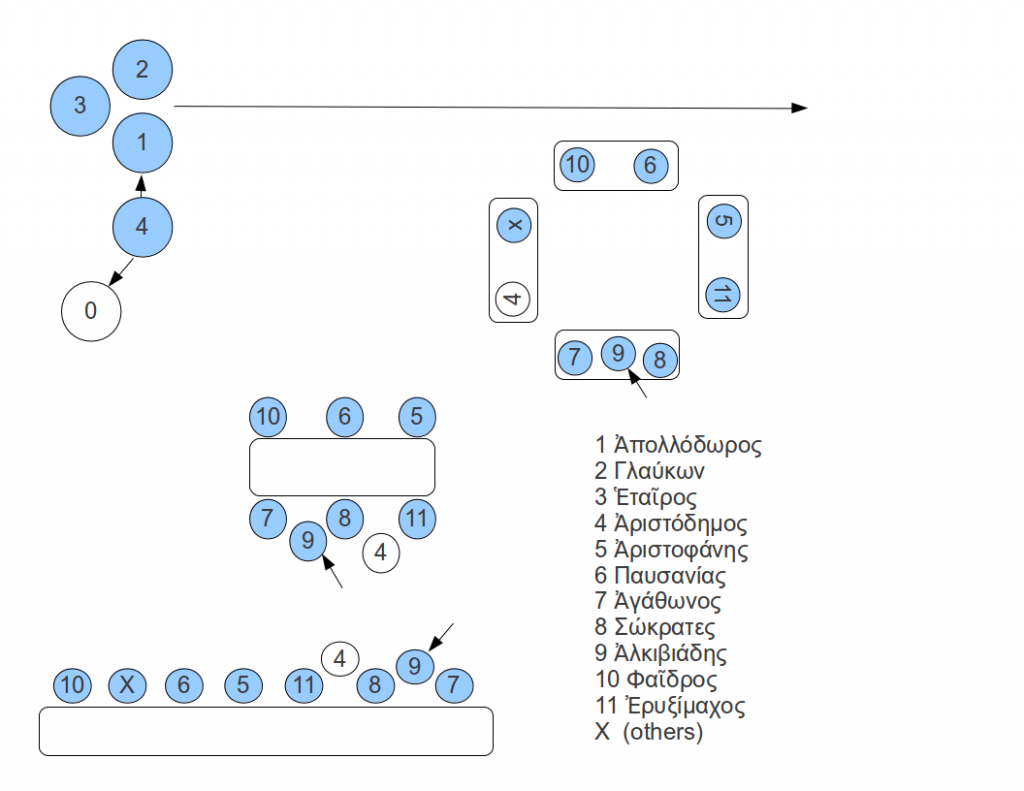The symposia project creates ensoniment (a term adapted from Jonathan Sterne’s Audible Past) of Plato’s Symposium using eleven distributed text to speech processes arranged in the positions of the speakers in the putative drinking party in which a number of participants conversed and gave extended monologues. Typical interpretations of the Symposium focus on concepts of love developed in the individual speeches, such as found in Wikipediaand countless introductions to English and surely German, French, and perhaps Latin translations. They mostly miss its careful study of character position within virtual realities implied by the text, and give little thought to its complex framing of narratives. (For example, the tension in the outer frame between a generic reader, Apollodorus and Glaucon, and the special reader who responds in the voice of the companion.) Perhaps we can better conceive the text from the position of media specific analysis of virtual realities by hearing it instead of just reading it. Consider what it would sound like in different configurations of the participants. In the long row Aristodemus would be the farthest from Phaedrus, whose speech is less faithfully recorded in the narrative Aristodemus recounts. Other configurations would produce different ‘actual’ audible fields had the event been recorded with two microphones representing the position of his head in the virtual physical environment, like in immersive first person games. There is the added complexity of remembering this retelling thematically occurs while two walk for hours for an early critique of intellectual tools (Greek alphabetic writing).

Possible positions of speakers and listeners for ensoniment of Symposium. This project uses the eSpeak text to speech API.
In this session I seek participants willing to compile and run the the latest revision of the symposia project (symposia.sourceforge.net) on their personal computers. Another possibility is to run prepared VirtualBox virtual machines that I supply on USB thumb drives that boot into the latest Ubuntu with the appropriate software libraries and tools installed so they are ready to check out the code directly from Sourceforge, compile the symposia executable, and launch the start script to run it.
The software allows creation of never before heard phenomena by processing an ancient Greek text via text to speech synthesis, a text that at the same time played a substantial role in forming the basis of our intellectual culture. This distributed processing can also include concurrent text to speech synthesis of the original Greek translated into English and other languages so that you can hear many voices at the same time.
I hope this session can open into a discussion of ways programming can be considered a form of humanities research, how classical studies and philosophy can be tightly integrated with working code, and ways source code can be critically studied.
Technical Requirements to run the symposia Virtual Machine image
-VirtualBox OSE (4.0.4) installed
-4 GB free disk space
-1 GB system RAM
-Bridged network
-Sound enabled


OK, consider me very intrigued. Just to be clear, I will need a laptop to participate in this, and not just my iPad — is that correct? I just want to make sure I bring the proper tool for this session.
The current version of the software requires a GNU/Linux-based development environment (I’m using Ubuntu 11.04 and 11.11 on bare hardware and VirtualBox virtual machines–so you can use a Windows-based or Mac-based host) to compile and run the program to be one of the speakers (Apollodorus, Glaucon, companion, Aristodemus, Socrates, Agathon, Alicibiades). It will also be connecting to a MySQL database host over a wired or wireless network I will set up.
We are looking for interesting passages in the Symposium where there is a lot of interaction among the speakers to hear what it will sound like (hard not to say ‘see’ what it will sound like) in simultaneous Greek and English (and more languages if we have time in the workshop to add them) text-to-speech synthesized voices. I will update the main posting with more technical requirements in the next day or so. Thanks for your comment!
Love it! Crowdsourcing to the right crowd. I also plan to be present the day you are doing this, so now very curious to check your session out with my trusty laptop at hand.